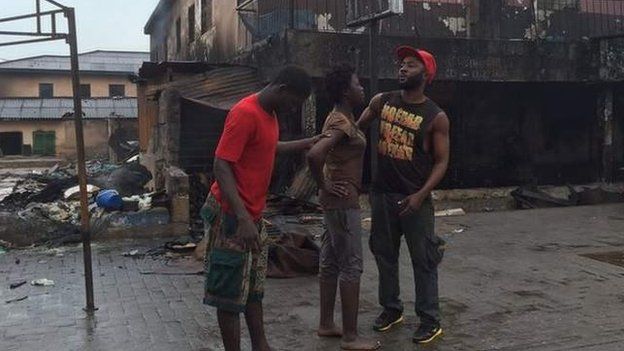UPDATED 6/5/15, 11:13 A.M. EST: Since the petrol gas explosion in capital Accra, the death toll has risen to nearly 200, according to Ghana’s Interior Ministry.
From Thursday night in to Friday, emergency vehicles recovered vehicles and picked up debris from storm drains.
Civilians also sought to salvage any items from their homes that weren’t destroyed by the floods.
Ghanaian President John Mahama said that restrictions will be put in place to stop civilians from erecting buildings on stream beds, which reportedly causes flooding throughout the city.
They pour rocks and sand onto the beds before constructing buildings, so when the rains come the water rises and is diverted into nearby communities causing flooding.
“I think that the time has come for us to remove houses out of water and the public should understand that it is necessary to save everybody else,” President Mahama said.
As investigators attempt to ascertain the details surrounding the petrol gas explosion, one witness reportedly said that the fire started after a cigarette was dropped; it was initially surmised that the explosion occurred after floodwaters swept diesel and petrol away from the station in to a nearby fire.
Either way, investigators have verified that petrol did indeed spill in to floodwaters before running through people’s homes.
According to journalist Sammy Darko, tensions flared among young men Friday morning, after authorities questioned them about the fire; they rejected being in any way responsible for the blast.
Watch President Mahama speak on the explosion and flooding here:
More downpours are expected over the weekend.
_________________________________________________________________________________
An explosion has caused the deaths of nearly 100 people in Accra, Ghana, according to various reports.
SEE ALSO: Mozambiquan Captives Remembered in Memorial
After two days of rain, the explosion was reportedly caused by a house that was on fire near a gas station.
Spokesman Billy Anaglate told the Associated Press, “[The waters] “caused the diesel and petrol to flow away from the gas station, and fire from a nearby house led to the explosion.”
With 96 people losing their lives to the explosion, it is likely so many were killed because they sought shelter from the incessant rains at the gas station.
TV footage showed corpses being piled into the back of a pickup truck and other charred bodies trapped amid the debris. Floodwaters around the site hampered rescue and recovery efforts.
Officials at the nearby 37 Military Hospital said its morgue had reached capacity.
Survivor and bus conductor Yaw Aforve, who was forced to sleep in his vehicle due to the weather, had his faced burned, after he jumped in to the waters and then re-emerged for air.
Of his experience, Aforve says, “I was swept away by the water to the other side [of the road],” he added. “I saw so many people screaming and shouting.”
But a Mother (pictured in second photo) wasn’t so lucky; she lost her child (pictured in blanket) to the fire.


The flood has caused many to abandon their cars in the streets, while, according to the BBC, “hundreds” remain “trapped” in their offices due to the torrential rains. Many of the aforementioned cars have also been carried away by the water.

In Ghana, rain in June is customary; however, an inferior drainage system makes what should be customary nearly unbearable.
Poor infrastructure has also caused ongoing blackouts that plague the city — with some lasting 48 hours — and galvanized protests in the streets.
On Thursday, Ghanaian President John Mahama went to the petrol station to pay his respects as well as praise rescue workers’ efforts for the lives they have saved.
Calling the death toll “catastrophic,” President Mahama assured Ghanaians that the deadly floods and its effects will not happen again, saying, “Steps will be taken to ensure that disastrous floods and their attendant deaths do not occur again.”
According to forecasters, more rain is coming.
Watch news coverage of the blast here:
SEE ALSO: Tree in Guinea Source of Ebola Outbreak?














